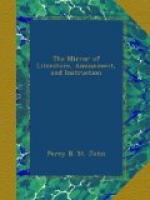Of a pale sunbeam, breaking o’er the face
Of the wild waters in their hour of warfare.
Thus much forgive; and trust, in such an hour,
I had not said e’en this, but for the hope
That when the voice of victory is heard
From the fair Tuscan valleys, in its swell
Should mournful dirges mingle for the dead,
And I be one of those who are at rest,
You may chance recollect this word, and say,
That day, upon the bloody field, there fell
One who had loved thee long, and loved thee well.
A MONK’S CURSE.
Hear me, thou hard of heart:
They who go forth to battle, are led on
With sprightly trumpets and shrill clam’rous
clarions!
The drum doth roll its double notes along,
Echoing the horses’ tramp; and the
sweet fife
Runs through the yielding air in dulcet
measure,
That makes the heart leap in its case
of steel;
Thou—shalt be knell’d
unto thy death by bells,
Pond’rous and brazen-tongued, whose
sullen toll
Shall cleave thine aching brain, and on
thy soul
Fall with a leaden weight: the muffled
drum
Shall mutter round thy path like distant
thunder:
’Stead of the war-cry, and wild
battle roar,—
That swells upon the tide of victory,
And seems unto the conqueror’s eager
ear
Triumphant harmony of glorious discords:
There shall be voices cry, Foul shame
on thee;
And the infuriate populace shall clamour
To heaven for lightnings on thy rebel
head.
* * * * *
THE COSMOPOLITE.
SUPERSTITIONS, FABLES, &c. RELATIVE TO ANIMALS.
(For the Mirror.)
A superstition prevails both in England and Scotland (Qu. Are Wales and Ireland excepted?) that Goats are never to be seen for twenty-four hours together, owing to their paying Satan a visit once during that period, to have their beards combed; indeed, since the classical representations of Pan and the satyrs, from whose semi-brutal figures we derive our own superstitious idea of the form of the evil one, goats, rams, and pongos have shared with serpents and cats the obloquy of being in a manner his animal symbols. The offensive smell of this animal is thus accounted for by the natives of South Guinea:—
Having requested a female deity to allow them to use an aromatic ointment which she used, the enraged goddess rubbed them with one of a very different description, and the smell of this has been ever since retained by the descendants of the presumptuous offenders.
We may here remark, that of late years some doubts have arisen, and not without foundation, respecting the wholesomeness of goats’ milk, hitherto believed to be, in many respects, superior even to that of the cow. The goat was much venerated by the ancient Egyptians, and never sacrificed, because Pan was represented with the legs and feet of that animal, but the Greeks destroyed it on account of its cropping the vines.




